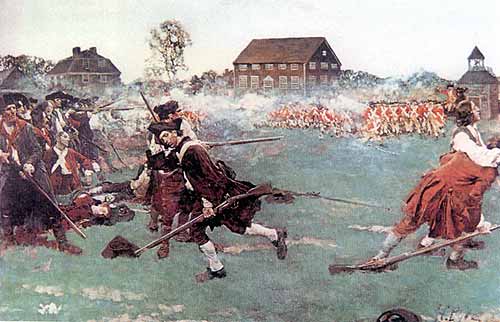
Posted on 04/19/2009 8:59:44 AM PDT by Pharmboy

On April 15th, 1775, Major General Thomas Gage decided to send a column of seven hundred troops (two hundred over the magic number that the Concord Congress had set) to Concord under the command of Lt. Col. Francis Smith and his second, Major John Pitcairn. Gage had no intention of tolerating anything approaching a repetition of the action at Fort William and Mary. Learning that the depot in Concord held a growing store of gunpowder and arms, he sent these soldiers twenty miles from Boston to seize the military supplies. On the evening of the 18th, Dr. Joeseph Warren, President of the Provincial Congress of Massachusetts, sent Paul Revere and other messengers to Lexington to warn patriots there.
When Colonel Smith moved into the countryside to collect these arms and munitions gathered by the patriot militia, hostilities erupted at Lexington and Concord on April 19, 1775. Soon afterward, militia contingents from places throughout New England took up positions outside Boston, putting the city under siege.
Paul Revere did not make it to his destination when sent to warn his countrymen that the British were coming. Captured and briefly detained, he was forced to walk home as the Redcoats retained his horse for His Majesty's service when they detained him.
~~~~~~~~~~~~~~~~~~~~~~~
LEXINGTON
Commanding the British troops was Major John Pitcairn (left) who marched his soldiers all night, arriving at Lexington at dawn. There he found a line of minute men drawn up on the village green commanded by Captain John Parker. The British halted and the Major shouted, "Disperse, ye rebels, disperse!"
(Excerpt) Read more at americanrevwar.homestead.com ...
Thanks for the post and the ping, Pharmboy.
God bless those men who took up arms. We wouldn’t be free now if it weren’t for them.
The truth about this particular episode is that the British were extremely brave. Imagine marching miles in column while the woods around you were alive with musket. I heard they had to send flankers out to disperse the Amercans and at the end of it, the flankers collapsed in exhaustion.
The day the White Horseman rode bump.
Once again, someone edits the actual words to avoid damaging our poor children's sensibilities. Colonel Smith's exact words were, "Lay down your arms, God damn you! Disperse, you rebel bastards!" "Bastard" was the favorite epithet of the day because so often it was true. It was the Golden Age of Illegitimacy.
The story about Paul Revere's horse is priceless. Most people today assume that everyone in that era knew basic horsemanship, but that wasn't necessarily true. John Adams, for example, hated horses and never learned how to ride. Paul Revere's story is a good example.
Silversmith Paul Revere's experience with horses was limited to hitching one up to a carriage. Then in the year before hostilities broke out, Revere took lessons and learned how to handle a horse. He found the experience intoxicating. After closing up shop, he could be found on the back roads near Boston running his horse flat out with the wind whistling through his hair. If you were on a back road in the evening and someone on horseback flew by you at high speed, it was safe to shout out, "Good evening, Mr. Revere." When the men of Boston were looking for volunteers to ride messenger duty, I have this image of Revere raising his hand and jumping up and down, saying, "Me! Me! Me! I'll ride!"
It should be noted that a whole host of riders went out that night, including Israel Bissell, who did in fact complete his mission, unlike Mr. Revere who was stripped of his horse by the British.
Let's not forget Poland's General Thaddeus Kosciusko!
Regards,
GtG
There were very few bastards in Massachusetts at the time. Those Great Migration puritans might have had a lot of six month babies but they did get married.
Thanks.
I recall reading (in Fischer?) that Revere would not have said “The British are coming” since at that time he considered himself British. He would have said
“The regulars are coming.”
True, but remember that Smith and Pitcairn were British, with the British experience of bastardy. And in Britain, it was everywhere.
Please accept my most humble apologies for a poor assumption.
Your Obdt. Svt.,
P_____y
bttt
Great post! Thanks, pharmboy. :)
Interesting story about Revere. I seem to remember that he occasionally rode between NYC and Boston carrying messages between the Sons of Liberty in those cities.
I still prefer the Naval version.
Many individuals of various countries joined directly in the fight - and the new country itself. The comments were about nations, though.
Technically that is a bastard.
Yes, American-British or some such. I really don’t like the “American” vs. “British” phraseology. I call it what they were - REBELS. But admitting ours were “rebels” would offend the Yankees who want to squelch any idea that it was OK to rebel.
The French are overrated. Seriously.
Fortune favors the bold. Luck favors the prepared. We’ll need to be both... ;-)
Disclaimer: Opinions posted on Free Republic are those of the individual posters and do not necessarily represent the opinion of Free Republic or its management. All materials posted herein are protected by copyright law and the exemption for fair use of copyrighted works.